Dankzij de Rambus only strategie voor de Pentium III SMP chipsets heeft Intel een gat in de markt laten vallen. Een gat wat dankbaar wordt opgevuld door VIA en Serverworks met hun chipsets die geen ondersteuning bieden voor Rambus, maar het goedkopere SDRAM. In een vergelijking bij GamePC wordt eens een blik geworpen op de chipsets van deze fabriekanten, en worden ze getest tegenover de i820 chipset van Intel. De Serverworks Serverset III LE en de VIA Apollo Pro 133A blijken prima te presteren vergeleken met de i820, maar zoals te verwachten was van een VIA chipset is deze net even iets minder snel dan de competitie, en ook de Serverset III LE chipset blijkt het in de meeste gevallen net af te moeten leggen tegenover de i820 chipset uitgerust met Rambus geheugen. Desondanks heeft vooral de Serverworks chipset een goede indruk achter gelaten ![]() :
:
Considering the Serverworks III LE and VIA Apollo Pro 133A are third party chipsets, both performed incredibly well. Intel has been making multiprocessor chipsets for much, much longer than these two companies, and even paired with faster Rambus DRAM, barely manages to outpace the competition. Even worse for Intel and Rambus, even with our Dual 800EB chips and Ultra160 SCSI RAID, the PC-133 memory chipsets managed to hold their ground and even outpace the Intel chipset in some cases. Even though I'm a fan of Rambus DRAM technology (There is 384MB of Rambus in this machine alone!), this gamble certainly did not pay off for Intel.
Serverworks has gained our respect with their LE chipset, which performed great, was rock solid stable, and really isn't all that expensive. While our testbed board did range in the $500 range, it also did include dual channel Ultra160 SCSI (~$300), Dual 10/00 Ethernet ports, and onboard video. Without these features, we could see Serverworks boards hitting under $200.
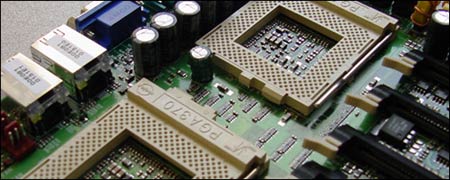 |

 Zoals blijkt is Rambus op dit moment nog niet echt waardevol, omdat de prestaties vrijwel gelijk zijn aan die van PC133 SDRAM-222. Wat de aanschaf betreft heeft Rambus zelfs een groot nadeel: RIMM-modules zijn vele malen duurder dan DIMM-modules! Op basis van de nu bekende gegevens ligt die prijs zelfs zes keer zo hoog. Over de oorzaak daarvan bestaat wel wat verwarring. Volgens veel fabrikanten is er bij de fabricage sprake van veel uitval, anderen zeggen dat er hoge royalties (vergoedingen) moeten worden betaald. Maar het lijkt toch vooral op onwil van geheugenfabrikanten.
Zoals blijkt is Rambus op dit moment nog niet echt waardevol, omdat de prestaties vrijwel gelijk zijn aan die van PC133 SDRAM-222. Wat de aanschaf betreft heeft Rambus zelfs een groot nadeel: RIMM-modules zijn vele malen duurder dan DIMM-modules! Op basis van de nu bekende gegevens ligt die prijs zelfs zes keer zo hoog. Over de oorzaak daarvan bestaat wel wat verwarring. Volgens veel fabrikanten is er bij de fabricage sprake van veel uitval, anderen zeggen dat er hoge royalties (vergoedingen) moeten worden betaald. Maar het lijkt toch vooral op onwil van geheugenfabrikanten.
 Essentieel voor succes is natuurlijk een brede ondersteuning van hardwaremakers en contentleveranciers. Die is er, beweert Volk. Tot de investeerders zouden Toshiba, Samsung en Creative behoren. Verder heeft Volk contact met drie van de vijf grote platenlabels. Volgend jaar brengen deze al honderden albums op DataPlay-discs uit, aldus Volk tegenover de Wall Street Journal.
Essentieel voor succes is natuurlijk een brede ondersteuning van hardwaremakers en contentleveranciers. Die is er, beweert Volk. Tot de investeerders zouden Toshiba, Samsung en Creative behoren. Verder heeft Volk contact met drie van de vijf grote platenlabels. Volgend jaar brengen deze al honderden albums op DataPlay-discs uit, aldus Volk tegenover de Wall Street Journal.
 1050)
1050) 6)
6) )
)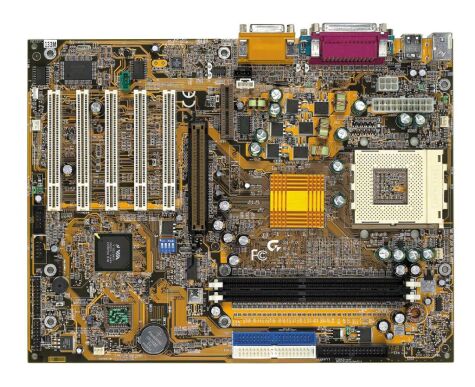
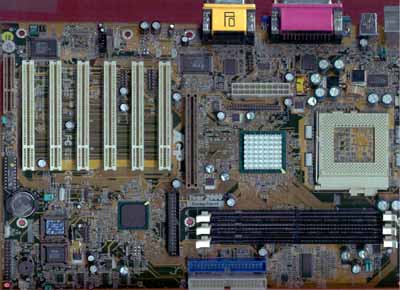
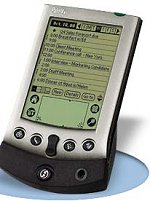 If you aren't familiar with the Palm, you're probably wondering how you can enter data into the unit without a ‘real' keyboard. Although you can buy a keyboard for an additional $100, there are two other ways to enter data directly into the Palm Vx. The first way is using the on-screen keyboard and you tap in your information using the stylus on the keyboard. It is functional, but slow.
If you aren't familiar with the Palm, you're probably wondering how you can enter data into the unit without a ‘real' keyboard. Although you can buy a keyboard for an additional $100, there are two other ways to enter data directly into the Palm Vx. The first way is using the on-screen keyboard and you tap in your information using the stylus on the keyboard. It is functional, but slow.


 Handspring and watch maker Citizen are tinkering with a prototype add-on for the Visor handheld
that would allow people to copy information from their device onto a second, credit card-sized
organizer.
Handspring and watch maker Citizen are tinkering with a prototype add-on for the Visor handheld
that would allow people to copy information from their device onto a second, credit card-sized
organizer.
 "We are doing very well in the chipset market and our
market share continues to increase," Brown said. "We
certainly expect that to continue as we move into next
year."
"We are doing very well in the chipset market and our
market share continues to increase," Brown said. "We
certainly expect that to continue as we move into next
year."
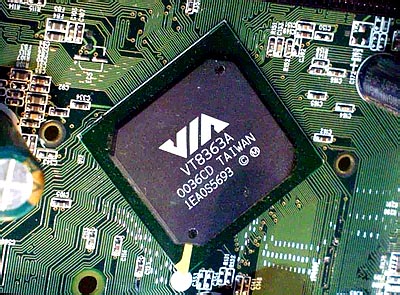
 While Chipzilla's website maintains its legendarily-tenuous grip on
reality in boasting that the Pentium III is currently available in speeds
of up to 1.13GHz, The Register learns that the truth is somewhat
different. Not only is the recalled chip not available, Intel today
confirmed that it isn't scheduled for its second coming until Q2 next
year.
While Chipzilla's website maintains its legendarily-tenuous grip on
reality in boasting that the Pentium III is currently available in speeds
of up to 1.13GHz, The Register learns that the truth is somewhat
different. Not only is the recalled chip not available, Intel today
confirmed that it isn't scheduled for its second coming until Q2 next
year.